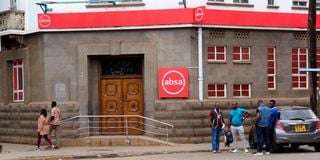Premium
Absa fights Sh1.5 billion data breach suit

Absa Bank branch on Muindi Mbingu Street in Nairobi.
Absa Bank has distanced itself from a Sh1.5 billion data breach lawsuit, saying it did not leak New Mega Africa Ltd's financial information or even warn its creditors of the company's financial woes.
Speaking through its corporate credit manager, Wycliffe Makori, the bank said the allegations of data breach by the logistics firm were baseless and unfounded.
The company has sued the bank for allegedly disclosing its confidential financial information to third parties and is seeking compensation of Sh1.5 billion. The money had been awarded to the company, but the High Court set aside the award to pave way for the hearing and determination of the entire case.
In the suit, the company, which transports clinker from Kenya to Tororo in Uganda for the manufacture and processing of cement and other related products, accused the lender of financial sabotage and disclosing its financial statements to strangers without consent.
The company alleged that the bank failed to maintain the secrecy of the client's account by printing the client's financial statements without authority or consent and disclosing them to strangers without the client's express consent.
The dispute stemmed from the bank's alleged refusal to approve the company's loan application on time, crippling its business. It is also alleged that numerous letters written to the bank requesting a restructuring of the loan were met with long delays, affecting the company's operations.
New Mega Africa Director David Abai claims that the leaked financial statement of the company scared other financiers who refused to lend money to the company, citing that it was broke and lacked the financial strength to service loans.
However, Mr Makori stated that following internal investigations, the firm's allegations of personal information leakage showed no wrongdoing on its part or that of any of Absa Bank's employees.
"The firm's allegations are thus outrageous, devoid of any merit and are intended to steal a march against the bank's demand of outstanding loan amount, which remains unpaid by the firm," Mr Makori said.
The witness added that as a corporate credit manager, he was neither created as a user nor had access rights to any of the bank's systems that store customer information.
"I thus had no capacity to generate any client statements from the bank's client databases and share them with third parties as alleged by the firm. I was only created as a User, for purposes of evaluating, on the Corporate Credit Risk System (CCRS) where applications for SME loans/business loans are processed," he said.
However, Mr Makori admitted that he had a friend who was working at the Kenya National Highways Authority (Kenha) in Mombasa at the time. Before moving to Absa Bank, this friend used to do background checks on various clients that his previous bank would finance for the authority's projects.
"The same relationship progressed in Absa Bank, where he would confirm invoices and payments of our mutual customers," said Mr Makori.
He said that when the company defaulted on its loan, he contacted his friend Eng. Jared Makori to enquire whether there was a delay in Mombasa Cement's payments, but the said friend did not get back to him despite promising to check the payment.
"I confirm that I did not share the firm's account or loan statement with Eng. Makori as alleged, neither did I promise to warn other creditors on the financial standing of the company," he said.
The witness admitted receiving money from the company's director, David Abai, but denied that it was a bribe, a kickback or a condition for obtaining a loan.
According to court documents, he explained that he and Mr Abai had a long-standing relationship since they worked at different institutions in Mombasa and attended the same high school in Western Kenya.
"I confirm that the M-Pesa payments made to my phone number were not related to the loans given to the firm. These transactions were simply exchanges of money between Mr Abai and myself on a friendly and personal basis," he said.
He also mentioned that some of the money he received was a repayment of previous personal loans he had made to Mr Abai.





